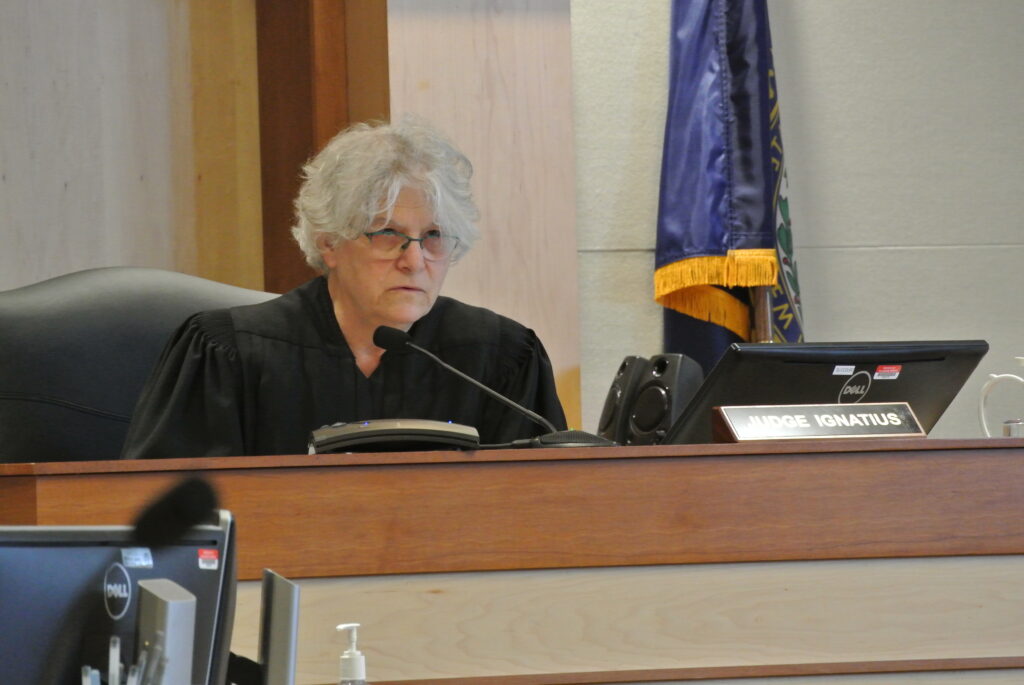State Accuses Sanborn of Stalling in His COVID Fraud Case

Former state Sen. Andy Sanborn said he is eager to defend against accusations he used his Concord Casino to engage in COVID relief fraud.
Just not yet.
“We are very much looking forward to meeting these allegations head-on in a fair proceeding … but not in a rigged proceeding,” said Zachary Hafer, one of Sanborn’s lawyers.

Merrimack Superior Court Judge Amy Ignatius
Hafer appeared in Merrimack Superior Court on Monday to ask Judge Amy Ignatius for an order forcing the New Hampshire Lottery Commission to treat his client fairly.
Sanborn was not in court. Hafer said Sanborn was dealing with serious medical issues.
Sanborn isn’t actually due in any court – yet — over charges he misused $844,000 in COVID relief funds to buy himself two Porsches and a Ferrari for his wife, state Rep. Laurie Sanborn (R-Bedford), among other accusations. New Hampshire Attorney General John Formella has opened a criminal investigation into the alleged fraud, and he has referred the case to the United States Attorney’s Office.
While Sanborn has not been charged with any crime, he still faces the loss of his casino license over the allegations. Sanborn was scheduled for an Oct. 13 hearing before the New Hampshire Lottery Commission after Formella declared Sanborn was “not suitable to be associated with charitable gaming in New Hampshire due to evidence of COVID-19 relief fraud involving Concord Casino’s charitable gaming business.”
But Sanborn and his team have stalled, making demands about the evidence, the rules of the hearing, even who the presiding officer will be, said the attorney representing the Lottery Commission, Assistant Attorney General Christine Wilson.
“We’ve offered them pretty much everything they want. I think they’re trying to drag out this process,” Wilson said.
On Oct. 12, Sanborn’s legal team got a temporary court injunction to stop the Oct. 13 hearing, claiming they did not have enough time to mount a proper defense and requesting a delay until Dec. 3. On Monday, Hafer and his team requested an additional delay to Dec 11.
Wilson said pushing the decision on Sanborn’s license to next year could be a net positive for the embattled owner.
“Running out the clock is a real possibility,” Wilson said.
Sanborn’s casino license expires on Dec. 31, as a matter of course. Wilson said that allowing it to expire without getting revoked could make it easier for Sanborn to transfer ownership.
Hafer took umbrage at the suggestion that he and his team are stalling.
“The idea we’re operating in bad faith and trying to run out the clock is nonsense,” Hafer said.
Judge Ignatius seemed skeptical that there was a role for her in this drama. The casino industry already has a body for complaints, rulings, and appeals — the Lottery Commission.
“Why is this in the superior court?” Ignatius asked.
Hafer argued court intervention was needed because the Lottery Commission is playing games like “heads we win, tails you lose.” He said he wants Igantius to order the Lottery Commission hearing for December, require the Lottery Commission to follow one set of fair administrative rules, pick a fair, qualified independent professional to oversee the hearing and prohibit any surprises from the commission.
The commission initially said it would not call witnesses for the Oct. 13 hearing but then gave Hafer and his team three different sets of witness lists. The commission also gave inconclusive answers when asked about the burden of proof that will be used at the hearing. The burden of proof being on the plaintiff or on the defendant depends on which set of administrative hearing rules are used, and the commission indicated it would use different sets of rules at different points, Hafer claimed.
Wilson acknowledged the commission could have handled things better. “Nobody is saying the process and how we got here is perfect,” Wilson said.
Hafer also worried the commission would bring up old accusations against Sanborn as part of the hearing on his license.
Sanborn’s history includes accusations of stiffing creditors in a 2000s business bankruptcy case. There is also a history of sexual harassment allegations from his time as a state senator, which resulted in a New Hampshire Department of Justice investigation. Sanborn was cleared in 2018 of bribing a Senate intern in connection to those allegations.
As for the current accusation, the commission and the New Hampshire Attorney General’s Office aren’t professional accountants, Hafer said. The state investigation is riddled with errors and is based on incomplete and unaudited financial records.
“At best, this investigation was sloppy. At best,” Hafer said.
Ignatius said she would release a written order laying out the role she sees for the court in this dispute, but she made it clear that her goal is to get this case “back in the hands of the Lottery Commission.”



